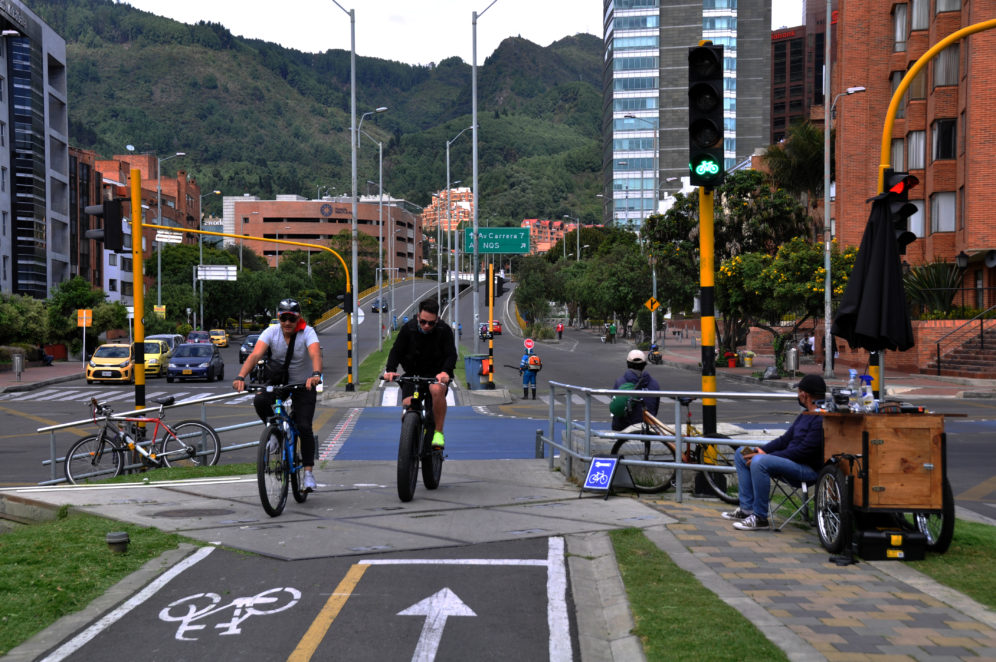
February 09, 2022
Bogotá Wins 2022 Sustainable Transport Award
WATCH THE FULL 2022 SUSTAINABLE TRANSPORT AWARD CEREMONY >>
In 2005, a diverse group of organizations joined together in an effort to promote sustainable mobility around the globe. The goal of this group was and continues to be, to highlight best practices and showcase real-life examples of transportation projects in cities addressing climate change, equity, and resilience.
Thus, the Sustainable Transport Award was born, along with its Committee and a process that continues to identify cities that are leading the field in sustainable urban development practices, prioritizing quality of life and the environment in their transport policy.
The first winning city was Bogotá, thanks to their BRT system and urban cycling strategy.
Now, seventeen years since the STA’s founding, Bogotá has won the Award once again, thanks to their swift adaptation to the unique mobility demands posed by the pandemic. In this way, Bogotá has been a true model for vigilance, resilience, and responsiveness in the face of great change.
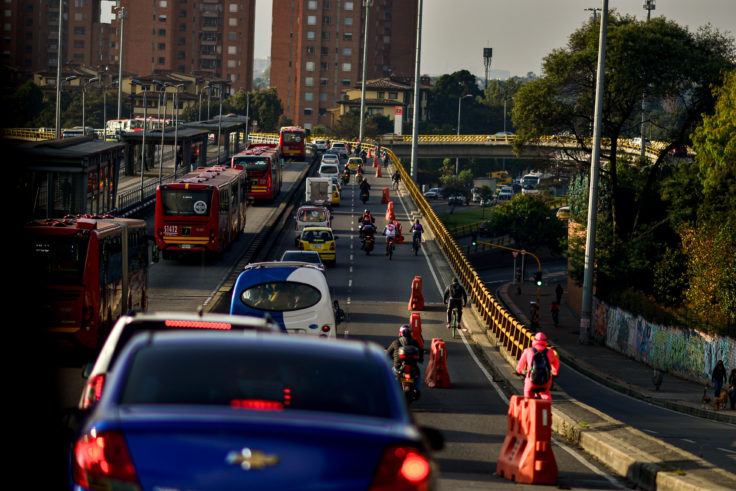
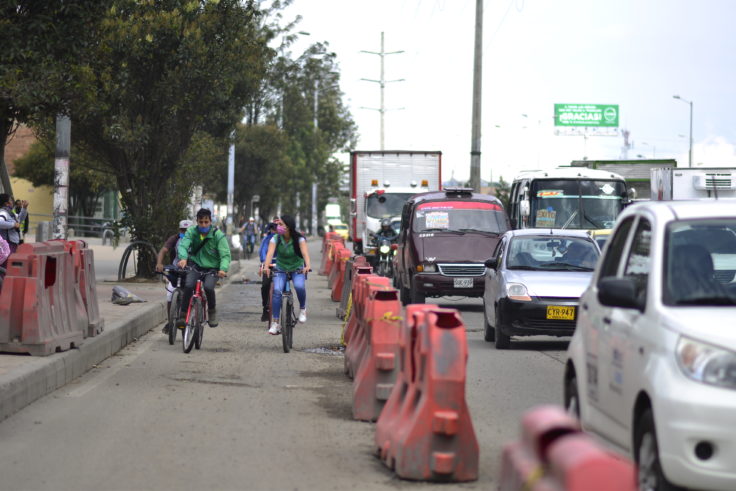
What won Bogotá the 2022 Sustainable Transport Award?
Soon after the COVID-19 pandemic began, Bogotá became one of the first cities in the world to create emergency bike lanes. 84 km were built, with 28 km becoming permanent and 46 km still in use today. On some of the city’s main roads, bike use quadrupled as a result of the newly implemented cycling lanes. The COVID-19 changes were cemented with official policies, such as Acuerdo 804, which established biking as the priority means of transport in the city in future planning efforts. These policies built on previous goals formalized in the City’s 2020-24 Strategic Plan, which included growing the number of cycle trips by 50% by 2024. The City also reconfigured street space to allow for better social distancing and pedestrianized streets that once only served cars. Over the course of one project, 17,000 square miles of street space were repurposed for pedestrian use.
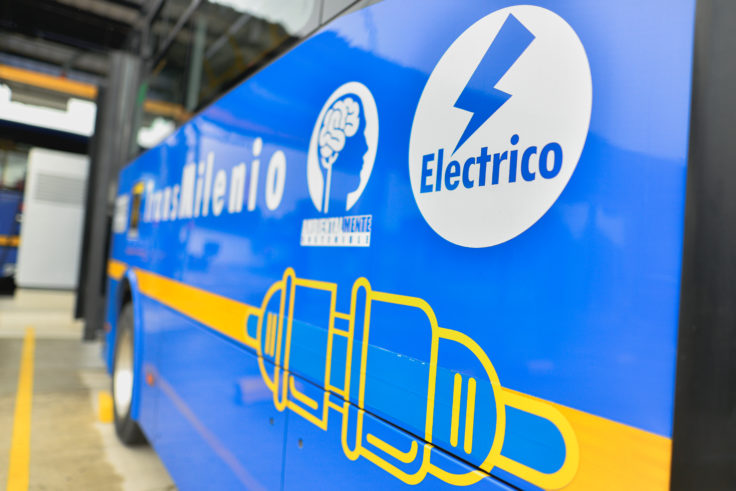
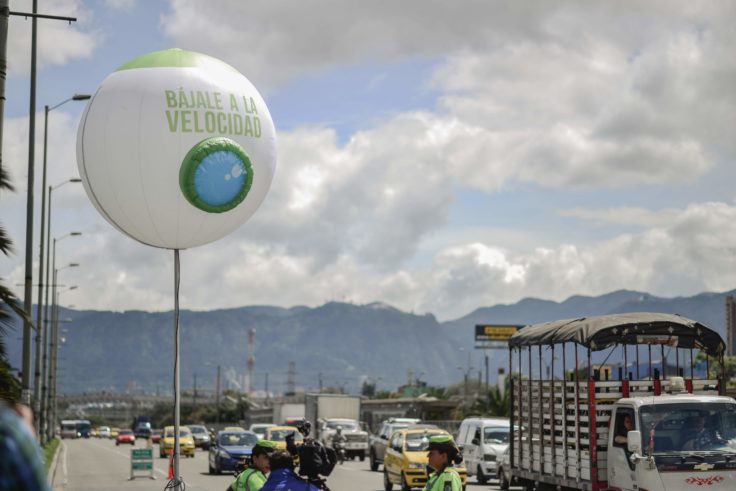
To improve public and environmental health, the City of Bogotá has assembled a fleet of 1,485 electric buses for its public transportation system—placing the city among the three largest e-bus fleets outside of China. 350 buses have been deployed so far, and the switch will benefit low-income residents the most, whose neighborhoods have the most bus lines and highest air pollution levels in the city. Additionally, Bogotá has begun a new program that provides exemptions to high-occupancy vehicles (HOVs), those with more than 2 passengers, from the city’s odd-even license restriction program. This program prevents half of the city’s cars from driving in peak times, but by allowing HOV exemptions, the city aims to encourage carpooling and expects to reduce car travel by 2 million kilometers weekly.
The City also improved road safety with traffic calming measures and speed management programs. The speed reduction on major roads brought a 21% decrease in traffic deaths in 2019 compared to the 2015-2018 average, and a 28% decrease in 2020.
Bogotá further focused safety efforts on some of the city’s most vulnerable residents: its schoolchildren. The City found that 58% of student trips are taken on foot, mostly by low-income children. At the same time, pedestrians younger than 15 years old were twice as likely to die in a traffic incident than adults. In response, Bogotá began a Kids First program that targets students who commute on foot and those who commute via different transportation modes. Among other initiatives, Kids First created caravans for young commuters by foot and by bike, led by adult guides. Since it began, the program has helped more than 6,000 students get to class safely.
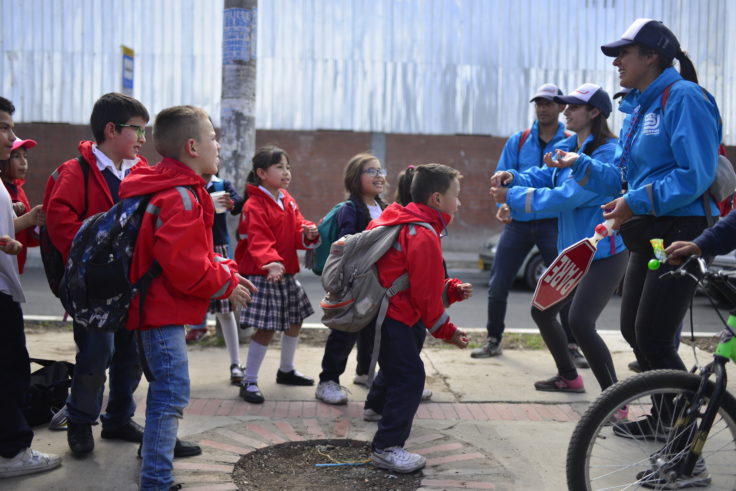
Bogotá’s current administration shares their urban mobility plans for the future
BiciCarga – Pilot for last mile distribution with cargo bikes
Bogotá launched a pilot program to promote alternative solutions to the current demand for the final distribution of goods in the city. By encouraging e-cargo bikes for last-mile deliveries, the city aims to boost efficiency, reduce emissions, and improve mobility conditions.So far, the project has designed a last-mile distribution model based on cycle logistics, formed a value network in cycle logistics, and implemented the first collaborative platform for last-mile delivery with e-cargo bikes, while reducing the cost of deliveries by 31%. The next phase of the project focuses on the implementation of last-mile distribution operations using zero-emission solar-powered e-cargo bikes or trikes.
ZUMAs – Clean Air Urban Areas
ZUMAs, also known as Clean Air Urban Areas, aims to improve air quality by reducing particulate matter emissions and exposure. ZUMAS will be established not only in areas highly affected by poor air quality but also where vulnerable communities reside. Air quality and emissions will be addressed through community participation and education, promoting sustainable transport modes, paving and road repair, vegetation improvements, and regulation on polluting vehicles and industries, among other initiatives.
Bikeshare System
The bikeshare system of Bogotá will be a sui-generis system with a unique inclusive vision, realized by the diversity of bicycles and services offered to residents. It will deploy 1,500 mechanical bicycles, 1,500 electric ones, 150 handbikes (as an accessory for any wheel-share, providing independence to the final user), 150 cargo bikes, and 150 bikes with child seats. In addition, the system will provide a 20% discount to low-income residents and make 300 public bike repair stands available for free for all users. Thus, the system is not only one of the largest in Latin America—it is one of the most inclusive, providing sustainable mobility options to citizens across gender, ability, and economic status. The City has signed a contract with the Brazilian company Tembici and will start operations in the second half of 2022.
Honorable mentions given to Peshawar, Pakistan, and Tartu, Estonia
Along with Bogotá, two honorable mention cities—Peshawar, Pakistan and Tartu, Estonia—were recognized for their successes over the past year..
Tartu has achieved a carbon-neutral public bus system, complemented by an electric bikeshare system that is accessible all over the city. At the same time, the City has pedestrianized and revitalized its streets, making them greener and safer, becoming a role model city in the region.
Peshawar’s BRT system runs 220 hybrid buses along 65 km of bus lanes, increasing access to the city for all its citizenship, and especially women. Female ridership increased from 2% to 20% since the BRT system was launched, narrowing the gender gap in travel modes and increasing women’s access and security in the city.
There is no one-size-fits-all formula when it comes to a model for sustainable city. The STA celebrates the unique, diverse ways that cities implement sustainable mobility to face climate change, expand access , and grow its capacity to adapt to the changing circumstances of our world.
ITDP and the STA Committee celebrate these amazing cities, certain that we can learn from and work with them towards better cities around the globe.
Learn more and watch the full 2022 STA Ceremony at www.staward.org >>
